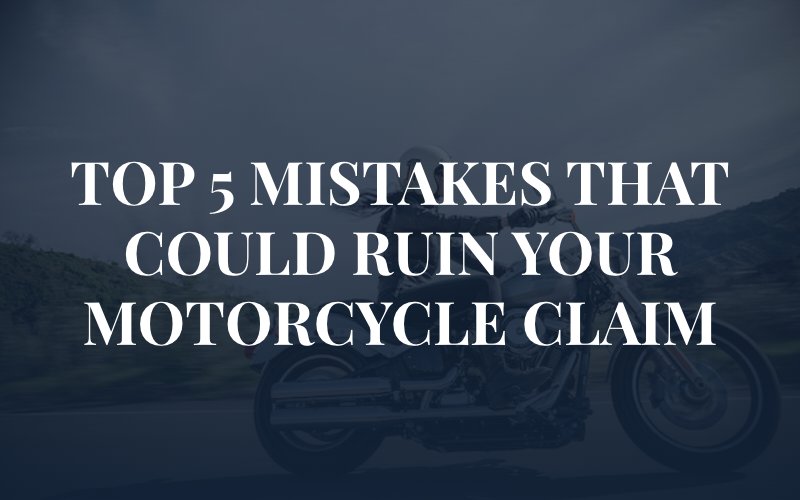
A motorcycle ride is an exhilarating experience and a gas-friendly way to enjoy a daily commute, a weekend scenic ride, or a thrilling road trip. But the same open, two-wheeled design that makes a motorcycle ride exciting also leaves riders vulnerable to grave injuries in an accident. Motorcycle accidents have serious consequences both physically and financially. After an accident, a lot depends on what an injured rider does or does not do at the accident scene and in the following days. Avoiding five common mistakes after a motorcycle accident can help protect a rider’s physical and financial future going forward after the accident.
Some motorcyclists worry more about their bikes than themselves at the scene of an accident, but it’s critical to do more than brush yourself off and then brush off the paramedics. After a motorcycle accident, even if you think you’re uninjured, you should always accept EMS transportation to a hospital or make arrangements to go to an emergency room as soon as possible. Sometimes adrenaline at the accident scene can mask injury symptoms that appear later.
At the hospital, ask for a complete medical evaluation and a detailed report of your injuries with your doctor’s treatment recommendations listed as well as your prognosis.
During the emotional and chaotic aftermath of a motorcycle accident, you may find yourself making verbal statements to the driver and police officers that are later construed as admitting fault. Even if you only said, “I’m sorry” because you were sorry the entire event occurred and you empathized with the driver’s distress, the insurance company may consider it an admission of fault. Instead, don’t apologize or talk to anyone at the scene about the details of the accident. Even if you think you might have caused the accident, later evidence could show otherwise, but by admitting fault at the scene an investigation may not undo the damage or there may be no investigation at all.
After an accident, some drivers agree to exchange insurance information and not call the police to report the accident. Even if you believe you haven’t suffered significant injuries, failing to call the police can make it difficult to protect yourself later if the other driver claims injuries.
After any traffic accident—including motorcycle accidents—it’s critical to call the police and ask for a detailed police report. Don’t forget to gather the contact information not only of the involved driver but also of any eyewitnesses to the accident. In an accident claim, eyewitnesses can be the key to recovering damages like medical expenses, lost wages, and compensation for pain and suffering, but all too often, an eyewitness disappears before the accident victim thinks to add their contact information to their phone.
Never agree to give a recorded statement or talk to insurance company representatives on a recorded line. Insurance companies often use an accident victim’s words out of context against them later.
Insurance company representatives may sound kind and compassionate over the phone, but remember that an insurance adjuster’s job is literally to find ways to underestimate a claim or deny it completely to protect company profits. Often they quickly offer an accident victim a lowball settlement before the victim even knows the full extent of their damages. Accepting the settlement means you’ve signed away your right to seek full compensation for injury-related future medical expenses and more. You cannot file a lawsuit after accepting a settlement. Always hire an attorney and then direct all communication with insurance companies to your lawyer. The motorcycle accident attorneys at Shapiro | Delgado have offices in Sarasota and Bradenton and offer free case consultations. We only take a fee after we secure your compensation. Reach out to our personal injury attorneys today online or by calling (941) 954-4000